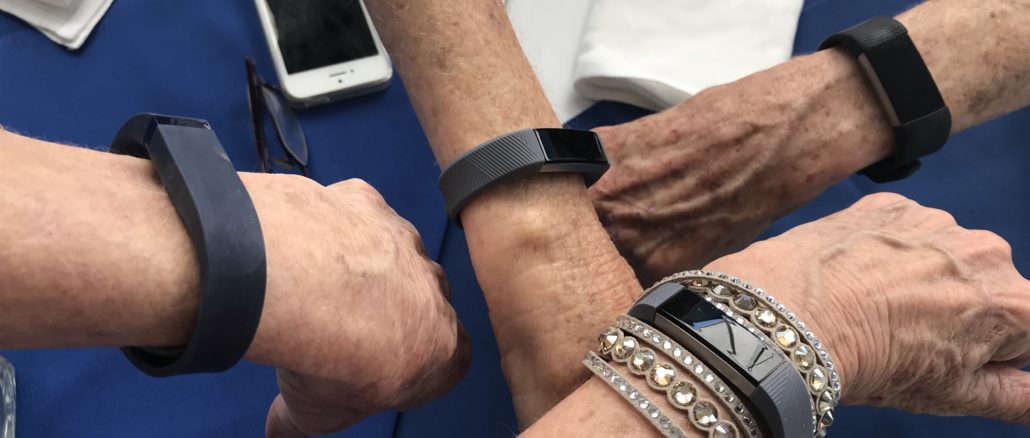
What is a fitness tracker?
Definition extracted from the internet PC Magazine:
“a wrist-worn device that can detect some combination of walking steps, running distance, heart rate, sleep patterns and swimming laps. Fitness bands interact via Bluetooth with an app in a mobile device that configures the device and downloads the wearer’s activity data“.
It basically is an electronic device you wear like a watch or bracelet. It pairs (or communicates) to a computer program (Application or App) via the Bluetooth and imports information from one device to another. These new devices are a modern computerised version of a pedometre.
To further add to your understanding (or maybe confusion) Bluetooth is a wireless control network that communicates (in our invisible wireless atmosphere) between computers and other mobile hands-free devices, that have a limited range of service between each other.
We need Bluetooth for the devices to be able to electronically communicate with each other at close range. It has nothing to do with the colour blue nor teeth. The name comes from medieval Scandinavia where the Viking King of Denmark Harald Bluetooth became famous for uniting parts of Denmark and Norway into one nation and converting the Danes to Christianity. He was a uniter, as are our trackers united, by Bluetooth.
What we call them?
You may also hear people refer to their electronic tracker devices as Fitbit, Smartwatch, Garmon Vivosmart, Nokia Steel, Moov Now, Misfit Ray, Xiaomi Mi Band, Activity Bands, it’s endless and I suggest you investigate them.
There are many brands in the marketplace, all of which incorporate a whole variety of functions according to your needs and budget. Some are waterproof. There is also a range for kids suitable from around 4 years upwards. My eleven year old grandson loves his tracker for sleep and exercise.
I chose a Fitbit Alta HR due to the inclusion of a heart rate monitor and its size. I have a small wrist and don’t normally wear a watch so this was perfect. I tried on a friend’s Fitbit prior to my purchase seeing we wear them constantly. I wanted to see how it felt. Plus you can buy interchangeable stylish bands at great prices on eBay. This can become addictive.
Who uses them?
Don’t assume that it is basically the younger generation who know what I am talking about, and l shall let you into a little secret. We older generation, seniors, are on to it already!
We have embraced our fitness devices with a passion, and for good reason, longevity.
They are our wellness device and play an important role in monitoring our health, sleep and exercise patterns.

I have noticed a number of senior people wearing devices when I’m at the shops, particularly older women. However more recently and to my delight, when I attended my friends 70th birthday celebration I discovered more fellow tracker converts, and all women.
I was introduced to a new fun group of intelligent females, married and single. Their ages ranged mostly from the fifties to seventies. As I proceeded to order my first glass of champers I said “I feel guilty as I will need to record my drink on my Fitbit”.
Well I almost fell off my chair as immediately three new Fitbit wrists were proudly displayed before me on the table cloth!
Yes, here were three ladies all in their early seventies sitting next to me wearing their devices and they were all Fitbit’s. I’m not saying Fitbit is the one to use, however it obviously meets our needs as all four of us wore one, albeit slightly different models. I soon discovered two women at our table in their twenties wore devices but we ‘senior women’ ruled the day.
Why we seniors use them?
Fitness trackers are now much more than basic step-counters. They are a 24/7 wellness device, with an emphasis on heart rate monitoring, sleep tracking, sports tracking, and they can even help to detect health problems like heart arrhythmia and sleep apnoea.
Personally, I feel as we grow older it is more important than ever to monitor our health and fitness to keep ourselves in check. Naturally, common sense tells us to use them as a guide, consult with your doctor at each check-up and update them on your statistical pattern. It provides a better understanding of your daily habits and over time provides accumulated historical data.
Benefits of wearing a fitness tracker:
- Motivational flash messages on the tracker when you sit for too long i.e. “feel like a walk?”, “wanna do some extra steps?”. Apart from the desire to reply “no” you actually do move your butt
- Specifically records, heart rate bpm, sleep patterns, steps taken and differentiates between walks and high intensity exercise
- Records food consumed if you input honestly as it manages calorie input and output, water intake and weight
- Provides a breakdown of your sleep patterns i.e. REM, deep sleep, light sleep and mini awake times during your sleeping hours
- Statistics are recorded and summarised day to day and week to week on your phone
- You are emailed weekly progress reports
- Promotes the feeling of being in control of your fitness
- Promotes your drive for self improvement
- Some fitness trackers may not have all these functions hence the need to consider what you are specifically keen to track
- I also use an App called My Fitness Pal as it has a better package food scanner for content and calories
SheSociety is a site for the women of Australia to share our stories, our experiences, shared learnings and opportunities to connect.


Leave a Reply